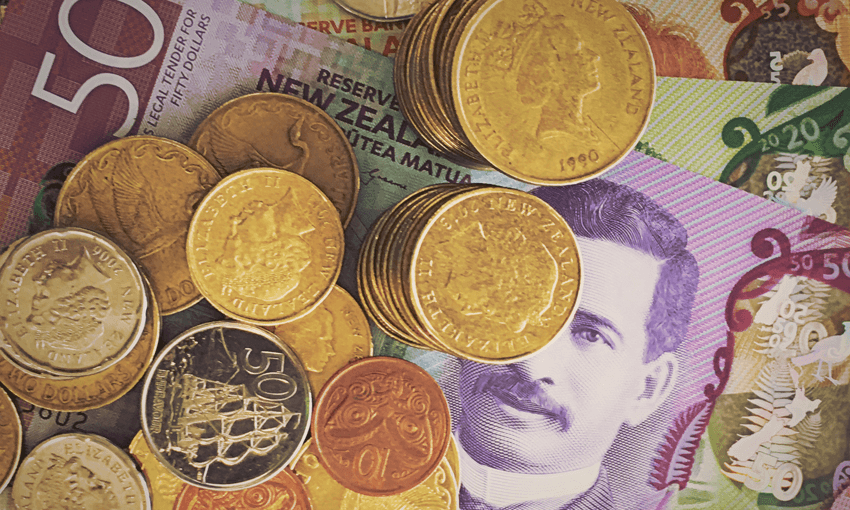All this week on The Spinoff, a series of pieces examine the crisis in our electoral funding rules. How did we get here? How might we fix it? Today, Action Station’s Laura O’Connell Rapira argues that the existing system simply cements the interests of the richest and most powerful.
This series is made possible thanks to Spinoff Members. Join Members to support more of this work.
Political donations are a hot topic in New Zealand news. But for most of us, even a $500 donation to our preferred party or candidate is out of reach. In an economic reality of low wages, high housing costs, flattened benefits and soaring food prices, there’s little left after bills to donate to a politician’s hoardings.
On the other hand, there are some people in our country who have millions of dollars and a keen interest in protecting the rigged economic rules that have enabled just 10% of people to hoard more than half of New Zealand’s wealth.
It’s a tedious story. Mega-rich person gives money to political party. Political party buys ads and influence to increase its electoral fortunes. Political party spends its time in power implementing and maintaining rules that help mega-rich person get richer.
And if everyday people start to get frustrated with the rigged economic rules? Just blame Māori or immigrants or beneficiaries.
Over the past 30 years, the pay of New Zealand CEOs has increased at more than double that of their workers with some taking home more in one year than others will in 40. This is your economy on big-money political donations.
RNZ recently found that some of New Zealand’s richest people have given tens of thousands of dollars to the New Zealand First Foundation in donation sums that fell just short of the amount at which they are required to be publicly disclosed. They also found that “one of New Zealand’s richest families, donated $50,000 [during the last election] using a law firm to make the payments in four amounts below the level at which donations are made public.”
Secret donations. Elite lawyers. Dynasty families. It’s the stuff of television. And there’s not even any suggestion it’s illegal: it’s how the system works.
But the New Zealand First Foundation is far from the only operation in which the sources of money are kept from the public. In 2017, at least four out of every five dollars donated to Labour and National were given anonymously, hidden from our scrutiny and oversight.
Fortunately, there are solutions that could and should be implemented if we want to write a new political and economic story. Despite the odds being stacked against us in terms of assets and wealth, there are actually more of us non-millionaires than them. We can demand more of the politicians and political parties who want to win our votes this year. We can demand enduring electoral reform.
The government could cap all political donations at $1,000 per year from any entity, including individuals. This would help level the playing field and make it more difficult for creative accountants to break down giant donations into smaller amounts without being noticed.
We could require full transparency and live reporting of donations online. And if donors wanted to protect their identity for privacy reasons then they could do so using the laws that already exist.
Currently, the Electoral Act contains a mechanism for anyone wanting to donate to a political party and not wanting their identity disclosed. The clincher? If you want your donation to be anonymous to the public it also has to be anonymous to the party receiving the donation. How it works is that the Electoral Commission aggregates all of the donations and passes them on to parties. The Commission does not identify the dollar amount of individual donations, or the number or names of donors. We could go even further by amending the law so that if it’s found that a donor used that mechanism yet disclosed their donation to a political party then there are legal and financial consequences.
As it stands, most donors do not use this protected disclosure avenue. The resulting suspicion is that such donors want something. For example: influence and political favour. A quid pro quo, even?
The government could also ban all donations from industries that cause harm to people and planet in much the same way we do with ethical KiwiSaver investments. Banning donations from anyone who represents the interests of fossil fuels, gambling, tobacco, big pharma, banking, alcohol, pornography, arms dealers and – if I had my way – property speculators would be huge for the health of our rivers, lakes and wild places and the wellbeing of our communities.
I’m a fan of publicly-funded elections but there will not be support for that to happen until politician’s earn back people’s trust, and removing the influence of big-money will help do that.
This election we could, among other things, demand a new kind of politics: one where you don’t have to be a millionaire to make a big difference. Where all of us giving what we can adds up to a powerful force for a fair and flourishing Aotearoa New Zealand.
Now, that’s a story I can get behind.

